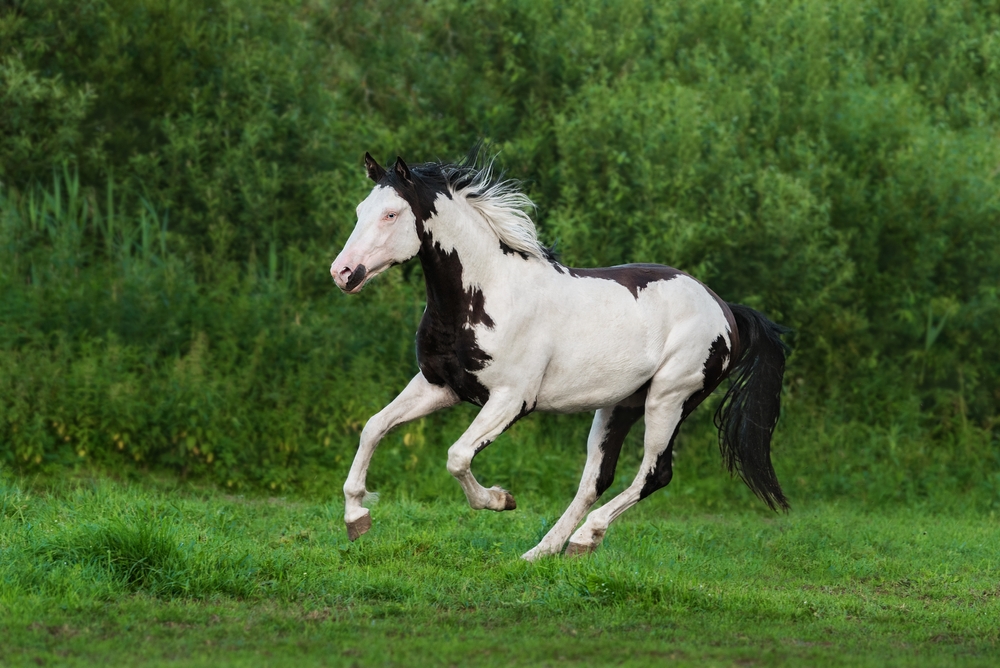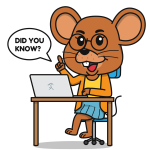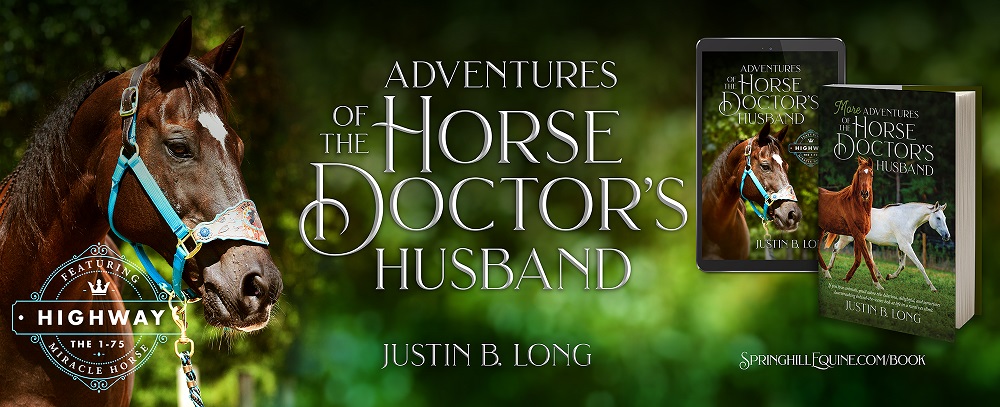
5, 6, and 7 Panel Testing
Whinny’s Wisdoms

Tony and I were chatting recently about genetic testing. Well, I was asking him questions while he was attempting to sunbathe, but let’s not argue over the details of the event. I had heard one of the Docs talking to someone about 5 panel testing recently, and I had no idea what they were talking about! Tony let me know 5 panel testing is so 2010. Now there’s 6 and even 7 panel testing! So off this mouse went to do some research about genetic testing.
The AQHA, APHA, and ApHC offer members a genetic test for a panel of 5 different genetic diseases affecting Quarter Horses. The panel tests for Hyperkalemic Periodic Paralysis (HYPP), Polysaccharide Storage Myopathy type 1 (PSSM 1), Malignant Hyperthermia (MH), Hereditary Epidermal Regional Dermal Asthenia (HERDA), and Glycogen Branching Enzyme Deficiency (GBED). The other two add-ons are Immune Mediated Myositis (IMM) and Overo Lethal White Syndrome (OLWS). All these diseases are genetic, and are caused by single mutations in DNA that are easy to test for. All AQHA breeding stallions have to have the 5 panel test results on file. All APHA (Paints) must have a 6 panel test result on file. The ApHC (Appaloosas) require HYPP testing of foals from an HYPP positive parent, and recommend stallion testing. This requirement doesn’t restrict the use of stallions that may test positive for one or more of the diseases, but it does give mare owners valuable information to consider when making breeding decisions.

Whinny Wisdom: All of these tests look for two gene copies. They are reported like this: A/B. One copy is A, and the other is B. The letter N is used to denote a normal copy, and the acronym for the disease is used to report the mutated version. So a single copy of HYPP would be reported as N/H, and two copies would be H/H.
HYPP
HYPP stands for Hyperkalemic Periodic Paralysis. This disease affects the electrical impulses within the body that control muscle contraction. The defective gene results in clinical signs of muscle tremors and fasciculations (mice just say ‘twitching’ but veterinarians have $10 words for everything). In some severe cases, horses may be unable to stand, or even breathe. Horses can show symptoms with only one copy of the defective gene, but symptoms are often more severe if they have two copies of the mutation. This disease mostly affects halter horses, and can be traced back to the prolific stallion ‘Impressive’. Since Impressive lines were also used in Paint and Appaloosa halter breeding programs, HYPP is found in those breeds as well. AQHA does not allow registration of foals that test positive for two copies of the defective gene (H/H), but will allow registration of foals that are H/N which is one defective and one normal gene.
PSSM 1
PSSM stands for Polysaccharide Storage Myopathy. This disease causes changes in the way sugars are stored and used by the muscles. It causes frequent episodes of ‘tying up’ if not properly controlled by a special diet and regular low intensity exercise. There are two types of PSSM. Type 1 is caused by a genetically identified mutation, which is testable. Type 2 is suspected to be genetic, but that mutation has not yet been identified by researchers. Most Quarter Horses with PSSM have type 1. Horses will show symptoms of PSSM type 1 with one or two copies of the mutation. Like HYPP, PSSM type 1 is more common in halter QHs than in other lines. Some QHs have been shown to have mutations for both HYPP and PSSM. There is no genetic test for PSSM2.
HERDA
HERDA stands for Hereditary Epidermal Regional Dermal Asthenia. Horses with HERDA have defective collagen, an important protein that is part of skin, cartilage, muscles, and tendons. The major clinical sign is skin that is easily injured, torn, or even sloughed off. The skin is also very slow to heal. There is no treatment for the condition, and horses that have it are often euthanized. Horses will only show symptoms if they have two copies of the mutation for HERDA. Horses with only one copy of the mutation are clinically normal. These animals are called ‘carriers’. They can pass copies of the mutation to their foals, and if one carrier is bred to another carrier, the foal might inherit the mutation from both parents and be symptomatic. HERDA is limited mostly to horses with reining and cutting horse bloodlines.
GBED
GBED stands for Glycogen Branching Enzyme Deficiency. Like PSSM, this disease also affects how sugars are stored, but in a different and more severe way. It results in abortions, stillborn foals, and foals that are alive but weak at birth and die or are euthanized soon after. Like with HERDA, horses may be carriers for GBED – if a horse has only one copy of the mutation it will be clinically normal. Paints and Appaloosas can also carry the GBED mutation.
MH
MH stands for Malignant Hyperthermia. This disease changes the way muscle cells handle calcium, and thus the metabolism of the cell. Horses with MH will appear normal most of the time, but have specific occasions when they show symptoms. During an attack, horses will have a very high fever, profuse sweating, high and irregular heart rate, high blood pressure, and rigid muscles. Attacks are triggered by certain anesthetic agents or stress, and are sometimes fatal. MH is believed to be less common than either HYPP or PSSM, but the percentage of affected horses is not yet known. Several breeds including Quarter Horses and Paints can be affected. Horses may be positive for both PSSM and MH together, and these animals appear to suffer from more severe episodes of tying up than horses that have PSSM alone.
IMM
IMM stands for immune mediated myositis. These horses are susceptible to sudden onset muscle wasting. It can be set off by many things, but most commonly the organism that causes Strangles is implicated. A Strangles vaccine can also cause an episode. Some of these horses can have episodes of profound muscle loss with no obvious cause at all. Horses with one copy are at about 20% risk of having an episode, while horses with two copies of the gene are at an 80% risk of having an episode. Double positive horses generally have worse muscle wasting and are at a higher risk of life-threatening complications.

OLWS
OLWS stand for Overo Lethal White Syndrome. This genetic mutation is associated with the coat pattern known as frame overo. Frame overos have white centered on the body and neck, meaning it doesn’t cross the topline. If you’ve got one copy of this gene you are only a carrier, and won’t experience any issues. However, foals born with two copies don’t form their intestines properly, and cannot survive.
Genetic testing is super important for breeding! It’s actually pretty useful for anyone with a horse, but that’s a different blog. Knowing all this information about a stallion and mare can help make successful breeding decisions. Knowing all this information about any horse can help you and my Docs make good health choices! For example, knowing that a horse has a copy of the MH gene means any procedure requiring anesthesia will be managed very differently. I hope you’ve enjoyed this dive into the 5, 6 and 7-panel tests. I think I will spend the remainder of my day in the sun with Tony talking genetic testing. I’m sure he’ll love it!
Until next week,
~Whinny
P.S. If this just whetted your appetite and left you wanting more knowledge about these problems, you can listen to the podcast my docs did, or watch a video they made. Both take a deep dive into these disorders, but the podcast is the most in-depth. If you want pro-level knowledge, check them both out!
 Whinny’s Wisdoms is the official blog of Whinny the Clinic Mouse at Springhill Equine Veterinary Clinic in Newberry, Florida. If you liked this blog, please subscribe below, and share it with your friends on social media! For more information, please call us at (352) 472-1620, visit our website at SpringhillEquine.com, or follow us on Facebook!
Whinny’s Wisdoms is the official blog of Whinny the Clinic Mouse at Springhill Equine Veterinary Clinic in Newberry, Florida. If you liked this blog, please subscribe below, and share it with your friends on social media! For more information, please call us at (352) 472-1620, visit our website at SpringhillEquine.com, or follow us on Facebook!
[jetpack_subscription_form title="Subscribe to Whinny's Wisdoms"]

